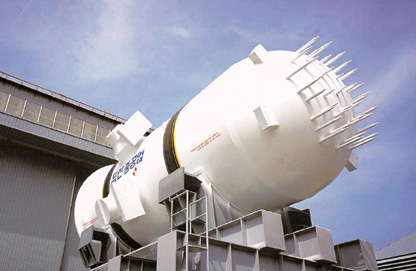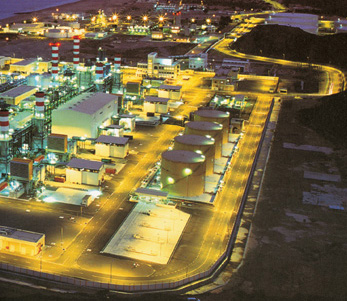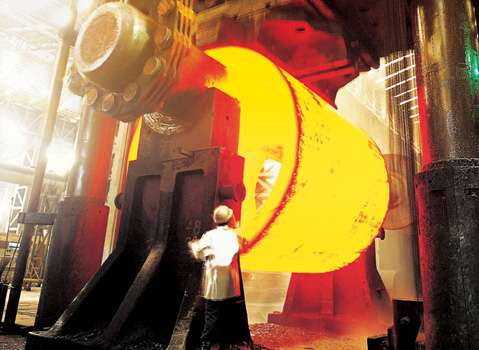Doosan, Undisputed
Desalination Market Leader
Has a track record in landing mega-projects
 Doosan Heavy Industries and Construction Co., Ltd., since its establishment in 1962, has been a driving force in the Korean heavy industry sector by contributing to technology development and improving a competitive edge. Doosan has established itself as a leader in the global power and desalination markets by building power and desalination plants.
Doosan Heavy Industries and Construction Co., Ltd., since its establishment in 1962, has been a driving force in the Korean heavy industry sector by contributing to technology development and improving a competitive edge. Doosan has established itself as a leader in the global power and desalination markets by building power and desalination plants.
Doosan has a track record: being awarded with such mega-projects as the Sipat Thermal Power Plant that will light the homes in India, the world's largest Shuaibah Desalination Plant that will turn the Saudi Arabian desert into forest, the replacement steam generation for the Sequoyah Nuclear Power Plant unit 2 that will solve the energy problems in the United States, and the high-speed railway that will connect the northern and southern parts of Taiwan.
Doosan on March 3 unveiled 2006, mid- and long-term business plans, calling for, among others, a push for exploring overseas markets and fostering futuristic businesses.
The company decided to strengthen its presence in the power generation and desalination business sector in the plant construction market of the Middle East where an increasing number of mega-project orders are likely to be placed in the wake of the boom, caused by an oil dollar influx. Doosan plans to concentrate on the exploration of the emerging U.S. nuclear market, and Asian and African power generation/desalination markets.
The company will strengthen overseas business capabilities through foreign production center buildup and expanded global outsourcing and others to raise the overseas portion of sales to 60 percent in 2006. Doosan aims to receive 4,656 billion won in project orders, 3,923 billion won in sales and 301 billion won in ordinary income in 2006, representing a 27.5 percent surge, an 18.8 percent jump and a 36.1 percent rise over the previous year with a goal of chalking up 6,226.4 billion won in orders, 6,306 billion in sales and 576.6 billion won in ordinary income by 2010.
Doosan is setting its sights on developing the technologies of new and renewable energies like wind power and fuel cell that will serve as a driving force in the development of futuristic industries.
 Doosan Heavy Industries and Construction President Lee Nam-doo expounded his three management policies, including "Site-Oriented Management," "Maximum Implementation of Vision and Strategies,"and "Collaborative Labor-Management Relations."He also said, "Customer satisfaction and corporate values come form the work site. I plan to implement management plans centered on the work site such as production factory, offices, and construction sites."STRONG PRESENCE IN GLOBAL SALINATION MARKET. The global desalination market is huge as countries in Africa, Asia and the Middle East suffer from a chronic shortage of water. The value of the current global desalination market is estimated at $4 billion, equivalent to about 3.8 trillion won. Only the desalination market in the Middle East is forecast to rise to $30 billion by 2010 thanks of massive investments arising from an inflow of oil dollars, caused by crude oil price hikes.
Doosan Heavy Industries and Construction President Lee Nam-doo expounded his three management policies, including "Site-Oriented Management," "Maximum Implementation of Vision and Strategies,"and "Collaborative Labor-Management Relations."He also said, "Customer satisfaction and corporate values come form the work site. I plan to implement management plans centered on the work site such as production factory, offices, and construction sites."STRONG PRESENCE IN GLOBAL SALINATION MARKET. The global desalination market is huge as countries in Africa, Asia and the Middle East suffer from a chronic shortage of water. The value of the current global desalination market is estimated at $4 billion, equivalent to about 3.8 trillion won. Only the desalination market in the Middle East is forecast to rise to $30 billion by 2010 thanks of massive investments arising from an inflow of oil dollars, caused by crude oil price hikes.
Currently, Doosan leads the global desalination market with an approximately 40 percent, beating Italian, Japanese and British companies.
Doosan's rise to the top has never been done overnight. The company's strenuous efforts to make massive investments into the development of technologies since its entry into the market in 1978 have paid off.
Until the 1980s, Doosan had been served as an assistant of carrying out desalination projects due to a lack of design technology. However, Doosan finally succeeded in acquiring design technology, which had been dominated by the United States, Europe and Japan. The company developed the One Module method for the first time in the world. It possesses its own Hybrid technology, a process of desalination that combines the positive features of MSF and MED. If adjusted to varying environmental conditions, it's truly the most economical way to desalinate water. The largest hybrid desalination plant in the world is the Fujairah Plant (100MIGD = 454,600m3/day) in the United Arab Emirates.
 Starting with its successful completion of the Farasan Desalination Plant in Saudi Arabia, Doosan has been strengthening technological and marketing capabilities to become the world's largest supplier of desalination systems. Some of the major desalination projects completed which was wholly undertaken by Doosan include Assir of Saudi Arabia, Jebel Ali ",'ETaweelah A2, Umm Al Nar 'B'and Fujairah Water and Power of the UAE and Az-Zour Project of Kuwait. Especially, other on-going projects at hand are Saibya I, II & III of Kuwai, Sohar of Oman, Ras Laffan of Qatar, Shuaiban Ph. 3 of Saudi Arabia, Benghazi and Zawia of Libya.
Starting with its successful completion of the Farasan Desalination Plant in Saudi Arabia, Doosan has been strengthening technological and marketing capabilities to become the world's largest supplier of desalination systems. Some of the major desalination projects completed which was wholly undertaken by Doosan include Assir of Saudi Arabia, Jebel Ali ",'ETaweelah A2, Umm Al Nar 'B'and Fujairah Water and Power of the UAE and Az-Zour Project of Kuwait. Especially, other on-going projects at hand are Saibya I, II & III of Kuwai, Sohar of Oman, Ras Laffan of Qatar, Shuaiban Ph. 3 of Saudi Arabia, Benghazi and Zawia of Libya.
The Shuaibah Project in Saudi Arabia, now under construction by Doosan, has been selected as the "Best Desalination Deal in the World'by Global water Intelligence at the International Desalination Association (IDA) Water Forum held on March 6 in Dubai.
Shuaibah Desalination Plant, located on the shore of the Red Sea 100 km southwest of Jeddah, Saudi Arabia, will supply water to Mecca, Medina and other Islamic Cities. When completed, it will be the world's largest desalination plant with a daily capacity of 880,000 tons of fresh water for 3 million people.
NUCLAR POWER PLANT. As the sole Korean firm specializing in power plants, Doosan excels in the field of nuclear power generation unrivalled by another other contender domestically The company is fully capable of the whole business management procedure: procuring materials, design, production, construction, pilot operation , and maintenance that it advanced to overseas plant projects equipped with a package-type management service. The history of Doosan's engagement in the field of nuclear power generation dates back to the dedication of Yongkwang Nuclear Power Plant Units 1 & 2 in 1976. Doosan has so far built a total of 15 nuclear power units while six more are now under construction. Doosan is highly recognized both in domestic and overseas industries, particulary since over 90 percent of its products are made in Koreas. Doosan is also devoted to developing solution for nuclear waste solutions and other R&D programs.
 In its latest achievement in the overseas nuclear power market, Doosan on March 10 won a contract to supply nuclear equipment to the Palo Verde Nuclear Generating Station Units 1-3 in Arizona, the United States,
In its latest achievement in the overseas nuclear power market, Doosan on March 10 won a contract to supply nuclear equipment to the Palo Verde Nuclear Generating Station Units 1-3 in Arizona, the United States,
The replacement reactor heads are one of the core equipment of a nuclear reactor, which generates high-pressure coolant through a self-sustained nuclear chin reaction. The coolant produced by the reactor is used to generate steam in steam generators, which is to drive a turbine to generate electricity.
Doosan has been put on the top 10 list of Korean E&Cs which were awarded with a thank-you plaque on May 17 in recognition of contributing to Korea's achieving the US$200 billion mark in the accumulative value of construction orders that have been awarded from abroad. The company has so far won 31 overseas construction projects worth US$5.7 billion. nw
Doosan Heavy Industries and Construction President Lee Nam-doo
Doosan Heavy Industries and Construction excels in the field of nuclear power generation unrivaled by another company in Korea.
Doosan Heavy Industries and Construction is the world's desalination plant construction leader.
Doosan is also a strong performer in the castings & forgings sector.
3Fl, 292-47, Shindang 6-dong, Chung-gu, Seoul, Korea 100-456
Tel : 82-2-2235-6114 / Fax : 82-2-2235-0799